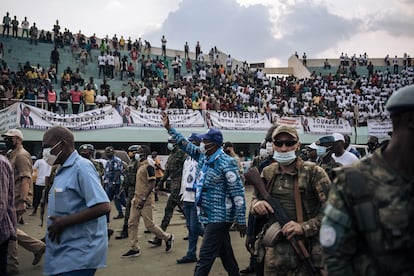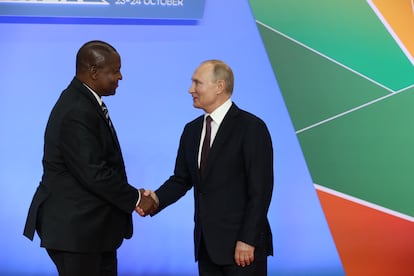The African laboratory of the Wagner Group: Diamonds, violence and political alliances
The Russian mercenary organization has turned the impoverished Central African Republic into a successful center of economic and military influence for Moscow

Russian citizen Dimitri Sytii was added to the European Union’s sanction list on February 25. According to the citation, Sytii, 34, “has a leading role within the Wagner Group in the Central African Republic (CAR), with close links to Yevgeny Prigozhin,” who heads up the Russian mercenary network that has a presence in Africa, the Middle East and Ukraine. It was Prigozhin who stated on social networks last December that Sytii had been the target of a parcel bomb in Bangui, the capital of the Central African Republic. Nine days after the attack, in which Sytii was seriously injured, Prigozhin visited him after he had been transferred to a hospital in Russia. The Wagner Group leader shared two photos. One showed the patient asleep with his right hand bandaged. In the second, Sytii was waving to the camera, with some additions to his hospital room visible: Prigozhin had left him six mandarins, some Christmas gifts and a framed photo of CAR President Faustin-Archange Touadéra.
The Central African Republic, a country of 5.5 million inhabitants, is one of the most poverty-stricken corners of the world, ranking 188 out of 191 nations on the Human Development Index. It is also the largest laboratory of overseas Russian power through the Wagner group, whose tentacles have spread successfully through the economic, propaganda and military arteries of the country. The text issued by Brussels in sanctioning Sytii and other members of the Wagner Group reads: “Given his influential position in CAR and his leading role in the Wagner Group, he is responsible for serious human rights abuses committed by the Wagner Group in CAR.” These abuses, which have been denounced by NGOs and U.N. rapporteurs, include “torture and extrajudicial, summary or arbitrary executions and killings.”
The Wagner Group’s businesses
On December 16, 2022, Sytii was at work in his role as head of the CAR branch of the Russian House, the cultural arm of the Russian Foreign Ministry. However, both Brussels and Washington attribute another role to Sytii as the founder of a company called Lobaye Invest, which was registered in Bangui in October 2017 for the exploitation of mineral resources in CAR, particularly gold and diamonds. Lobaye Invest is subject to sanctions imposed by both the E.U. and the United States. Another Russian businessman, Yevgeny Khodotov, is a partner of Sytii in the management of Lobaye, which is itself a subsidiary of M-Finans, a front company for the Wagner Group under Prigozhin’s control.
In late 2017, Russia informed the United Nations of its interest in sending weapons to the Central African Republic, which has been under an arms embargo since 2013 after a civil war erupted between Christian and Muslim militias, causing the deaths of nearly 5,000 people. The Central African Armed Forces (FACA) were unable to stop the bloodshed, so the U.N. gave Moscow the go-ahead. As well as weapons, Russia sent advisers and sealed defense agreements, a political alliance and concessions on the gold and diamond market. “Russia has created a successful model in CAR that it can export to any other country where it sees opportunities,” says Enrica Picco, Central Africa Project Director for the Crisis Group. According to Picco, Moscow has managed to install a “military hub” in the CAR, creating a center of influence under the guard of the Wagner Group from where the mercenary organization can expand its influence to other countries such as Mali or Burkina Faso.
The Wagner Group has paid a price for its position in CAR: dozens of mercenaries have been killed in battles against rebel militias for control of mining and customs interests, as well as in skirmishes with the FACA itself. But it has also profited: according to a U.S. diplomatic cable published by Politico in January, exploitation of the country’s mines could line the coffers of Prigozhin’s group to the tune of around $1 billion.

One of the most in-depth investigations on Russian influence in CAR was published last December by the French research project All Eyes on Wagner (AEOW), together with the Dossier Center, run by Russian opposition leader Mikhail Khodorkovsky, and the European Investigative Collaborations network. In one of the photographs included in the report, Sytii is pictured at an event with CAR authorities together with Yevgeny Kopot, Prigozhin’s right-hand man in Bangui, and the Russian gemologist Svetlana Troitskaia, who at the time worked for the Diamville company, which is allegedly in charge of transporting the diamonds and gold mined in the CAR out of the country, usually through the Cameroonian port of Douala. Diamville, which the E.U. considers a front company for Wagner, was registered in Bangui in March 2019, at the same time as Bois Rouge is registered, another company linked to the mercenary group and which is involved in the exploitation of the buoyant timber business in the southwest of the country.
In several videos posted online, Sytii appears as Kopot’s translator from Russian into French at public events. Before setting up in Bangui, Sytii, who holds a degree in economics and finance gained in St. Petersburg, completed a master’s degree in marketing and business development in Paris and another in cultural management at the International University of Catalonia between 2011 and 2012. The E.U. has also linked him to Diamville, although the AEOW investigation states that one of Sytii’s drivers, Bienvenu Patrick Setem Bonguende, appears as the head of the mineral trading company, and to two other companies linked to Moscow: Sewa Security Services, which provides a praetorian guard of Russian uniformed men for President Touadéra, and Lengo Songo radio, an organ of Russian propaganda. This entire network was included in the package of sanctions issued by Brussels.
Wagner’s men
Brussels also sanctioned Alexander Ivanov, who is described as a spokesperson for the Wagner Group in CAR and the head of the Russian Officers Union for International Security, which provided military instructors for the FACA; Konstantin Pikalov, codenamed Mazai, one of Wagner’s veterans in Africa and who, according to the E.U., is accused of being the instigator of the murder of three Russian journalists in CAR in July 2018; and Vitalii Perfilev, Touadéra’s security adviser.
Wagner’s intervention in the Central African Republic — with around a thousand mercenaries on the ground — was strongly supported by the local population after years of French influence and a period of extreme violence, which neither the U.N. military mission in CAR nor an E.U. peacekeeping force were able to put an end to. Five years after the arrival of the Wagner Group, however, instability persists, while reports of abuses committed by Prigozhin’s men against the civilian population and on the country’s mining resources are increasing. “There is growing discontent from civil society, the media and political parties,” says Remadji Hoinathy, a researcher at the Institute for Security Studies. ”But we must be cautious in comparing it with the rejection of the French presence in the Sahel because in this case, it was the Central African state that called on Russia to replace France.”
After the attack on Sytii — the parcel bomb he received contained a USB which exploded when inserted into a computer — Prigozhin issued a statement accusing France and its allies, including the United States, of being behind it. On January 1, Sytii, who has now recovered, provided details in an interview with Russia Today (RT). The package, sent via DHL, arrived in Bangui from Togo. According to video surveillance images in possession of the CAR authorities, the sender was a man aged between 30 and 40. He provided DHL with a Spanish identity card in the name of Alex Sevillano Mingueza. During the interview with Sytii, RT broadcast a photograph of a copy of this ID card. When consulted, the Spanish Ministry of Foreign Affairs said that they have no record of this case or of anything similar.
Sign up for our weekly newsletter to get more English-language news coverage from EL PAÍS USA Edition
Tu suscripción se está usando en otro dispositivo
¿Quieres añadir otro usuario a tu suscripción?
Si continúas leyendo en este dispositivo, no se podrá leer en el otro.
FlechaTu suscripción se está usando en otro dispositivo y solo puedes acceder a EL PAÍS desde un dispositivo a la vez.
Si quieres compartir tu cuenta, cambia tu suscripción a la modalidad Premium, así podrás añadir otro usuario. Cada uno accederá con su propia cuenta de email, lo que os permitirá personalizar vuestra experiencia en EL PAÍS.
¿Tienes una suscripción de empresa? Accede aquí para contratar más cuentas.
En el caso de no saber quién está usando tu cuenta, te recomendamos cambiar tu contraseña aquí.
Si decides continuar compartiendo tu cuenta, este mensaje se mostrará en tu dispositivo y en el de la otra persona que está usando tu cuenta de forma indefinida, afectando a tu experiencia de lectura. Puedes consultar aquí los términos y condiciones de la suscripción digital.









































